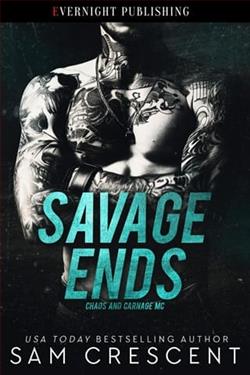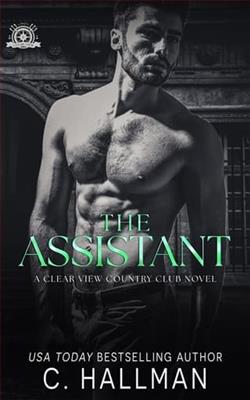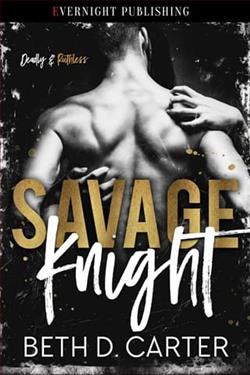Page 42 of Crocodile Tears
“Yes, you have – you and half of Inquisitus. You’ve probably openeda book on it – does Raine spend the day gorging on chocolates, working on cold cases, or hanging out on IS-hate holosites?”
Reed raised his hands in surrender. “Damn it, sir – I can never tell when you’re taking the piss.”
Josiah grinned. “Good!” He turned to go again, then glanced back. “You had money on the chocolates, didn’t you?”
“Yeah – and you just lost me a week’s pay.” Reed grinned. “Look, sir, this was my half-arsed attempt at asking if you’re okay.”
“I know, and I’m fine. Really. I’ll see you in the morning.”
“Yes, sir,” Reed replied, looking relieved the conversation was over. He wasn’t the only one.
Josiah dropped by Esther’s office to tell her he was going home. She barely glanced up – she trusted him to get the job done and knew he came and went at all hours to suit his investigation.
There were still a few reporters waiting outside when he left, but he ignored their questions and zoomed away without a second glance.
He played the recording of the trial that had led to Alexander’s sentence of servitude on his journey home. It made for interesting listening but provided no clues – although Alexander’s idiotic barrister said several things that made him either wince or chuckle, which perhaps shed some light on Alexander’s refusal to accept a lawyer now.
When Alexander took the stand, Josiah had to ask the duck to play his testimony twice, because he could hardly believe he was hearing the same man. Alexander sounded dazed and withdrawn, completely at odds with the sharp man Josiah had met today.
He mulled over the way Alexander had challenged him in the interview room. Was there really more to this than the obvious cliché of a disaffected IS manipulating his houder into changing his will, then killing him to gain his freedom? Or did he justwantthere to be more? It might have interrupted his annual car-polishing ritual, but he couldn’t deny that he was getting a buzz from this investigation, and didn’t want it to have such an anti-climactic ending.
After parking the duck in his garage, he paused for a moment beside the shining red Jaguar that had been Peter’s most prized possession. It was as if his late husband had just stepped into the kitchen to get a beer and would be back again at any moment. Josiah closed hiseyes and inhaled the scent of car polish, remembering the day they first met.
It was March 17th, 2082, and he was standing outside his new commanding officer’s tent in the makeshift supply camp at Reims. He smoothed down his jacket, straightened his shoulders, and then entered.
“Sergeant Raine reporting for duty, sir,” he announced.
A somewhat shabby-looking man in his late thirties looked up from where he was sitting on an old crate in front of a battered picnic table and placed a finger over his mouth.
“Shh – she’s sleeping.”
“Um… who is, sir?” Josiah asked. People had warned him that Captain Peter Hunt was an eccentric.
“This little lady.” Captain Hunt pointed at his jacket, which contained a suspicious bulge. “Want to take a look, Sergeant?”
“Uh… yes, sir?”
“Come here, then, but be quiet,” Hunt said softly.
Josiah did as he was told, and Hunt drew aside his jacket to reveal… a small black puppy. The creature was tiny – probably no more than a week or two old – and she was making little whimpering sounds in her sleep.
“Poor baby – her mother and the rest of the litter were killed by one of the trucks in the convoy yesterday. I couldn’t leave her there, could I, Sergeant?”
“Uh, I don’t know, sir. Are we allowed to keep pets?”
“Probably not.” Hunt grinned. “But she’s a baby – she wouldn’t survive if we left her, and as it’s our fault she’s all alone in the world, we have a responsibility to her, don’t we?”
“I suppose so, sir,” Josiah replied doubtfully.
“She can travel with us once we get going again. Nobody needs to know.” Hunt winked. His big, dirty hands were infinitely gentle as he stroked the puppy’s head. “One of the supply trucks broke down thismorning, so I fixed it,” Hunt explained, noticing Josiah looking at his grimy hands.
“Is that your job, sir?”
“Whatever gets the task done is my job.” Hunt shrugged. “It’s a bit different in the Peacekeepers than in the regular army, Sergeant. We’re away from base most of the time, out on the road by ourselves, and we have to make it up as we go along. Do you understand what we’re doing out here?”
“We’re on a humanitarian mission, escorting the food and medicine trucks, sir.”
“That’s right. Sounds easier than it is. There’s no government in most of these places, and no law and order – only rival gangs trying to steal our food and medical supplies – scavengers, who hunt in packs. There are people who will die without our help, so we have to protect our convoy at all costs. Understand?”















